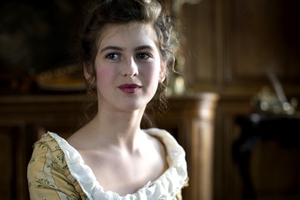Stuart:
From France comes this rather depressing biopic of Maria Anna “Nannerl” Mozart, sister of Wolfgang Amadeus. It’s the 19th Century and The Mozarts are touring relentlessly from court to court as the patriarch, Léopold (Marc Barbé), is forever trying to push young Wolfgang (David Moreau) to become famous. Nannerl (Marie Féret) is allowed to accompany him but, because of the sexist notions of the day, is forbidden to compose or take up any “manly” instruments such as the violin. A chance meeting leads to Nannerl having the ear and heart of Le Dauphin, a member of the royal family, and with this opportunity she is determined that her musical talent be allowed to flourish.
This is not a sumptuously realised period piece – the setting of Mozart’s Sister is drab and under-lit. Whilst the historical buildings may be impressive, there’s certainly nothing to feast one’s eyes upon. It feels like the filmmakers chose only to use natural lighting, and thus the nighttime scenes are almost entirely indiscernible. The camera itself never does anything exciting, either. There are lots of handheld close-ups, but that’s about it. It’s almost as if they simply did away with the storyboarding process.
Whilst the historical buildings may be impressive, there’s certainly nothing to feast one’s eyes upon. It feels like the filmmakers chose only to use natural lighting, and thus the nighttime scenes are almost entirely indiscernible. The camera itself never does anything exciting, either. There are lots of handheld close-ups, but that’s about it. It’s almost as if they simply did away with the storyboarding process.
So all that’s left is the story and the performances. Marie Féret is very good in the lead role (and the spitting image of her portrait), however it takes a while to get use to the stiff delivery of the entire cast. This is to accentuate the prim and proper behaviour of the privileged, I guess, but it feels awkward. Fouin gives a passionate performance as Le Dauphine, yet I was forever at a loss as to the nature of his motives. This flaw would lie with the script rather than Fouin, however it’s a stumbling block that was rather perturbing.
Mozart’s Sister is a dry film that’s never in any hurry, but it is somewhat enjoyable. It’s an interesting tale of the historical suppression of women, and like all good films of this nature, it delves into some cross-dressing shenanigans. That being said, this plot element doesn’t lend itself to humour in the way that say, Mulan or She’s the Man would. The film won’t be for everyone, and I sincerely hope that the secondary school teachers of the world don’t decide this is a good film to include in the syllabus, but it is entertaining in its own dry, historical manner.
Rating: